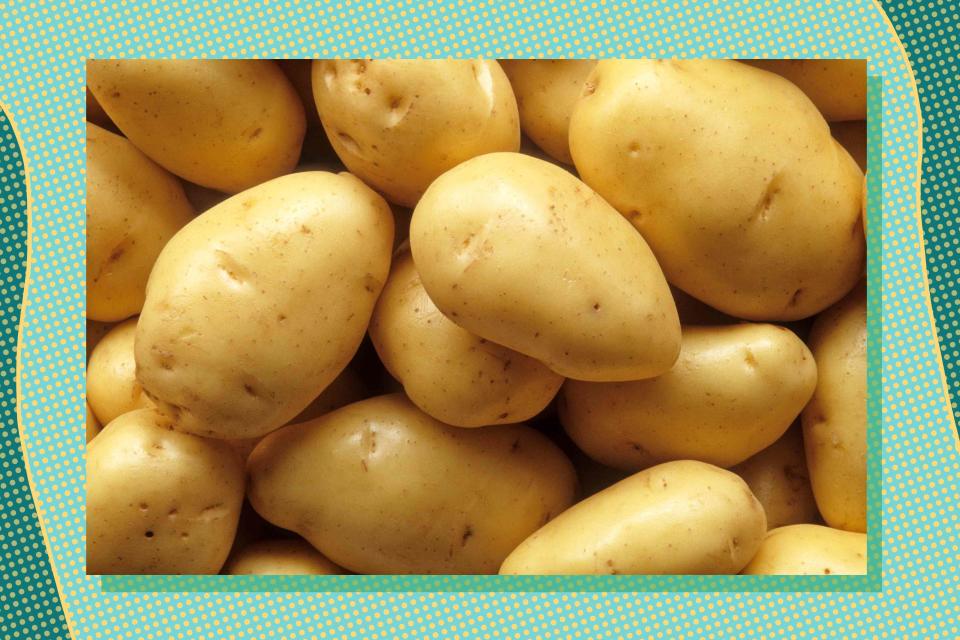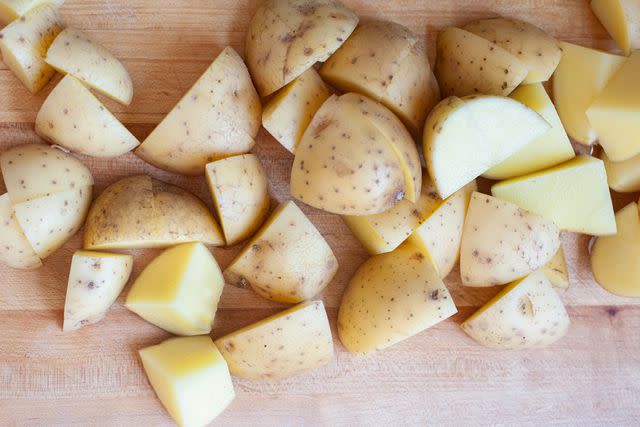Is It Safe To Eat Raw Potatoes? Here's What the Experts Say
Plus two tips to ensure your potatoes are cooked all the way.

Simply Recipes / Photo Illustration by Sarah Crowder / Getty Images
I once accidentally nibbled on a raw potato and immediately worried about what might happen. I’ve heard that I shouldn’t eat raw potatoes—perhaps even that it’s not safe.
No matter how you prepare these tubers—mashed, baked, boiled, or fried—there is a reason they are always cooked. “The cooking process helps break down the starches into simpler sugars, which enhances the flavor and makes the potato easier to digest,” says Danielle Gaffen, MS, RDN, LD, of Eat Well Crohn’s Colitis. So is it true that I should avoid eating them raw? Here’s what the experts say.

Simply Recipes / Sally Vargas
Is It Safe To Eat Raw Potatoes?
Taking a bite or two of a raw potato is okay, but eating a lot of it isn’t recommended. Consuming raw potatoes can lead to digestive issues and discomfort. “If someone accidentally eats a small amount of raw potato, they typically don’t need to worry unless they start feeling ill,” says Gaffen.
According to Bryan Quoc Le, Ph.D., food scientist, and author of 150 Food Science Questions Answered, “There will be some indigestion or cramping, but there's nothing that a person needs to do if they eat a bit of raw potato.”
Potatoes have two naturally occurring compounds—solanine and chaconine—known as glycoalkaloids. Le explains that glycoalkaloids can cause toxicity. Potatoes also contain lectins, a type of protein and antinutrient that can be harmful in large amounts. “[Raw potatoes] contain bitter, toxic compounds, such as solanine and lectins and resistant starches that are difficult for the body to digest,” explains Le.
Read More: Is It Safe To Eat Sprouted Potatoes? Here’s What the Experts Say

Simply Recipes / Alison Bickel
What Happens When You Eat a Raw Potato?
Eating raw potatoes can lead to digestive issues and provoke other ailments. “Resistant starches in small amounts work similar to fiber and can help improve bowel movements, but large quantities can cause stomach upset, gas, and bloating as they bypass the stomach and are fermented by microorganisms living in the intestines,” says Le. “Consuming high concentrations of lectins and solanine [found in raw potatoes] can cause headaches, nausea, diarrhea, and vomiting.”
Gaffen states that in extreme cases, a person could have solanine and chaconine poisoning. However, a person would need to ingest a large amount of raw potatoes.
“An average human being would need to eat 15 to 20 pounds of raw potatoes to cause serious poisoning,” explains Le. “However, if the raw potatoes are exposed to light, they can produce up to 10 times as much solanine and be much more toxic.”
Curious about what can happen when exposed to too much solanine? “Very toxic levels of solanine can cause hallucinations, paralysis, loss of sensation, or death,” says Le.
There can also be risks related to pathogens when you eat a raw potato. “Raw potatoes have a higher risk of harboring harmful bacteria or viruses, especially if they have not been properly washed and peeled before eating,” says Gaffen.

2 Tips for Ensuring Potatoes Are Cooked
Here are two expert tips to ensure your potatoes are fully cooked.
Use a thermometer: “If the center reads 210°F, that is high enough to thoroughly cook the potato [and get rid of toxins],” says Le.
Pierce test: You can pierce a baked, boiled, or fried potato to check if it’s cooked. “The potato should be pierced with a fork or knife, and it should slide in and out easily with no resistance when it’s fully cooked,” says Gaffen.

